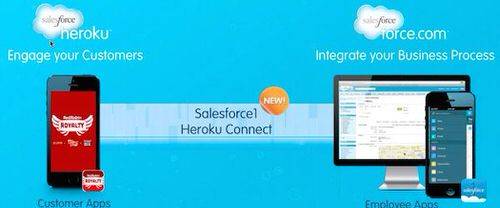Salesforce finally connected the powerful Heroku cloud application platform to its own database layer on Tuesday with the release of the Heroku Connect tool. The move was promised last year when the company debuted its Salesforce1 mobile app, which was designed as a mobile one-stop shop for all of Salesforce’s various business application tools.
Heroku and Force.com, the cloud computing platform as a service (PaaS) from Salesforce.com, represent two vastly different development systems based on completely different programming languages—but Salesforce now has a working bi-directional connection between them, in the form of the Heroku Connect Tool.
Released only in beta form in 2013, Heroku Connect is now live for all Salesforce customers that want to integrate the capabilities of both platforms to build customer-friendly apps.
Bridging The Gap
Force.com uses an object-oriented programming language called Apex, which was invented by Salesforce but incompatible with Heroku. This lack of synchronization became a major point of criticism when Salesforce purchased Heroku in 2010.
Conversely, Heroku developers often build their apps with programming languages like Node.js, PHP, Ruby on Rails, Java, Go, and Python—but none of these languages are compatible within Salesforce’s native environment.
Heroku Connect finally addresses this disconnection by allowing Heroku apps to sync with the Force.com database.
In an interview with ReadWrite, Margaret Francis, senior director of product management at Heroku, said restaurant chain Red Robin has begun beta testing Heroku Connect and it has already built a customer loyalty mobile app using Heroku for the front end interface.
Customers can interact with special offers in the app, for example, and the data gets synced back to Salesforce’s business process environment on the back end. Customer data flows from the Heroku-built user interface to business processes built with Force.com on the back end.

Instead of a deep integration with Heroku, Salesforce customers can at least connect those apps to Salesforce without the need for extensive recoding, which is a potentially expensive and time-consuming affair. Salesforce knows it needs to show off tools like Heroku Connect to attract developers and convince them Force.com will work with popular Web toolkits like Node.js, Ruby on Rails and Java.
In time, Salesforce may yet achieve a deeper level of integration with Heroku—but after four years, at least developers can connect the two worlds in a more seamless way. Developers need to be able to build apps quickly and at Web scale, and Heroku is one of Salesforce’s best weapons to allow them to do it.
Heroku Connect is part of the Salesforce1 Connected Customer App Package, and pricing varies based on app usage.
Lead image by Flickr user Danae Pollack under Creative Commons license
















